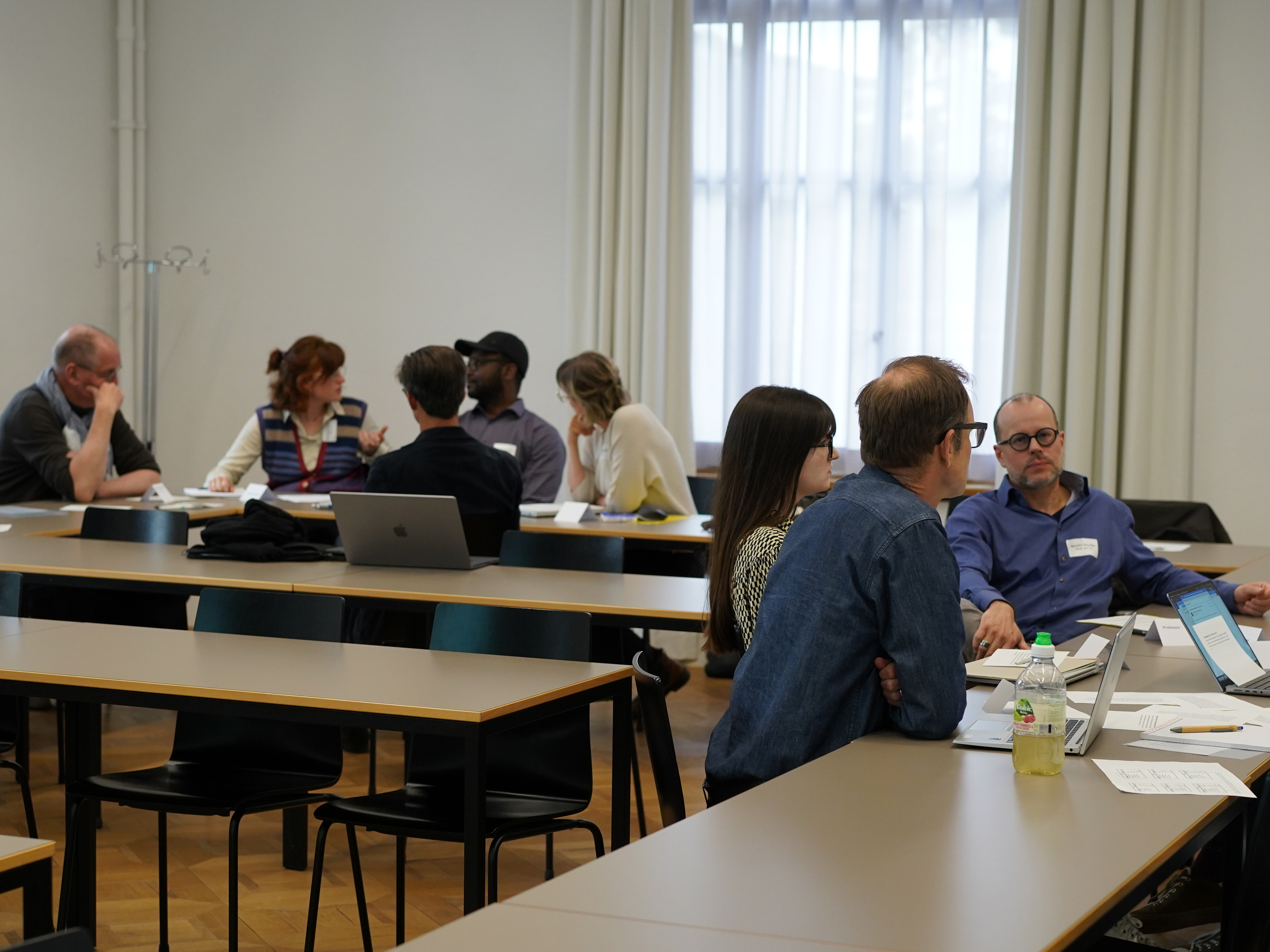Project managers meeting (2025)
Project managers meeting on 8 May 2025
On 8 May 2025, once again a project manager meeting was held under the Fit for Future programme to enable the exchange and transfer of information between the action areas. Following the status of the current and previous action areas, guest speakers gave presentations on the ‘Project to develop the University Library Strategy 2026-2030’ and ENLIGHT. In an interactive part, the participants discussed the topics ‘New Work’, ‘Administrative Processes’ and ‘Corporate Culture’ in three different groups, each focussing on change management. The participants were asked to adopt different roles with corresponding opinions. This adoption of perspectives was intended to promote mutual understanding and problem recognition.
Summary of the presentations
The project managers informed each other about achievements, challenges and upcoming steps in their projects. The presentations showed that work is in top gear everywhere to make the university fit for the future. The status of all action areas can be found on our website and has recently been updated based on the 4-monthly status reports and the PL meeting.
The University Library is also getting fit for the future and is currently working on a new strategy. The primary aim is to ensure that the complex structures are provided with a common vision and overarching processes. In various discussion forums with stakeholders, it is intended to pave the path towards a holistic university library with improved manageability. The project team is consolidating the 2026-2030 strategy with specific goals and measures in workshops on various fields of action.
As one of 10 research-intensive universities, the University of Bern is part of the Europe-wide ENLIGHT alliance, which aims to offer a seamless experience in teaching and research. In addition to funding opportunities, the University of Bern gains visibility, administrative support on mobility issues and networking opportunities by being part of the alliance.
ENLIGHT is anchored at all levels of the university: lecturers, students, various project teams and the core team are actively involved at the operational level, while the university management takes strategic decisions. The project pursues the following principles of cooperation: Communication across the Vice-Rectorates, university-wide thinking, clear responsibilities, regular workshops for the working groups and a focus on the target groups.

Conclusions gained from the discussions
New Work incl. change management
During the discussion, it was recognised that different ways of working must be accounted for when redesigning workplaces. Depending on the profile, position and work content, the requirements for the workplace are individual, the conception of the büroUNIversum project should be orientated on this and adapted to the specific requirements.
Not only between work forms, but also within a position, the requirements for one's workspace can change dynamically, e.g. in the course of a project. The action area "new workplace concepts" and the related ‘büroUniversum’ project is and remains a critical and controversial topic that must be approached with sensitivity and professional change management. For more information, please consult the UniFokus article “Working environments”, which addresses the topic and its challenges.
Pooling administrative processes incl. change management
There is widespread concern that the pooling of administrative processes will make the daily work of employees affected less varied and might create a ‘call centre’ situation. Nevertheless, the employees of the central administration are generally supportive towards the reorganisation. However, the fear of job and labour losses is also emphasised, particularly with regard to the reallocation of tasks and the concern that skills and knowledge are not sufficient for this. The need for flanking change management to address and, where possible, mitigate concerns and fears appears to be significant in this area too. This is likely to succeed insofar as the project does not aim to decimate jobs; it is merely a matter of handling administrative processes more efficiently and in a more focussed manner in order to facilitate the daily work of all involved.
Corporate culture (incl. leadership culture) and communication in the age of digital transformation incl. change management
With regard to corporate management and culture, the participants emphasised that a uniform culture for all members of the university is hardly realistic or only at a very low level. The heterogeneity of the university and the different working contexts must be taken into account in order to promote the right culture in the various environments.
In order to strengthen the team spirit, staff retention in particular is mentioned as being of great importance. This is all the more important as the university does not have an inexhaustible source of manpower. It was also mentioned that management tasks are often delegated to secretariats and that superiors do not always fulfil their management mandate adequately .
Conclusion and outlook
The desire for a requirements-orientated approach and feedback channels appears to be high. Change management is proving to be an unavoidable and important measure to accompany transformation. Suggestions such as the introduction of change agents or external support were received at the event. The advice to employees to report overwork early enough does not seem so trivial in view of the fact that exhaustion and more far-reaching consequences such as burnout are usually recognised too late by those affected. Accordingly, support and sensibilisation is essential at all levels, especially among the management.
The exchange of information and the discussions at the workshop are appreciated, so this format is also expected to take place in spring 2026.
